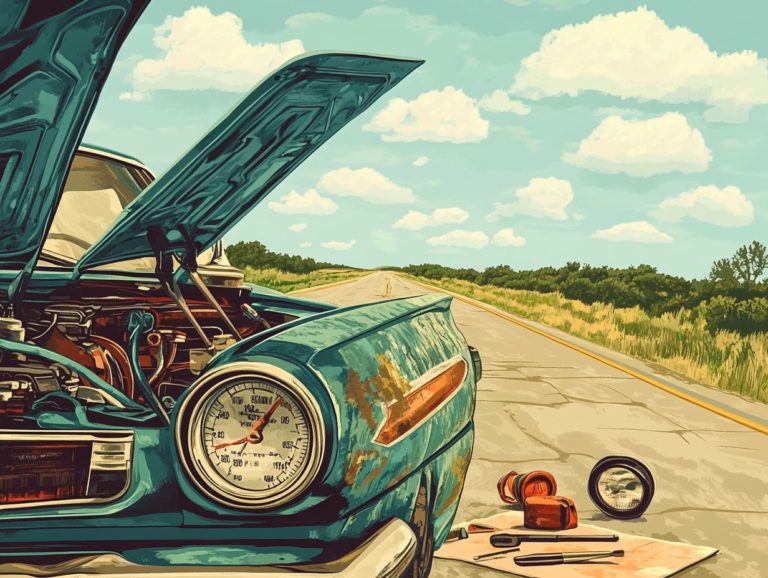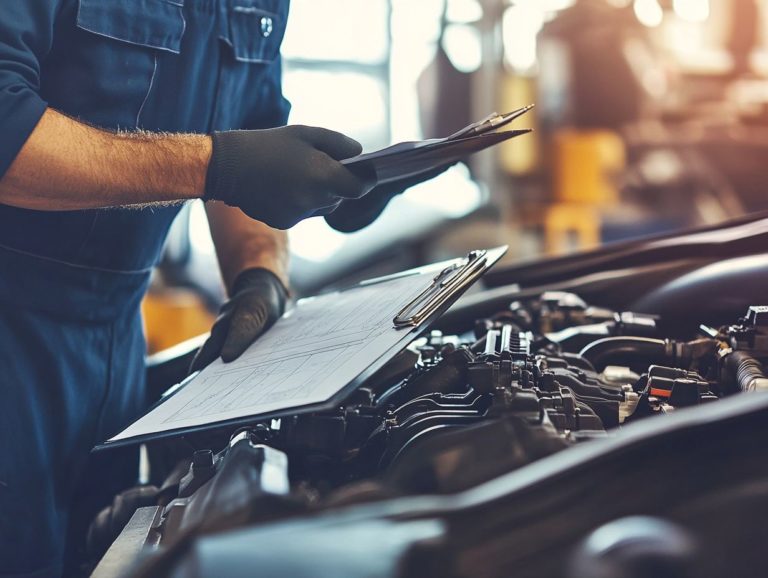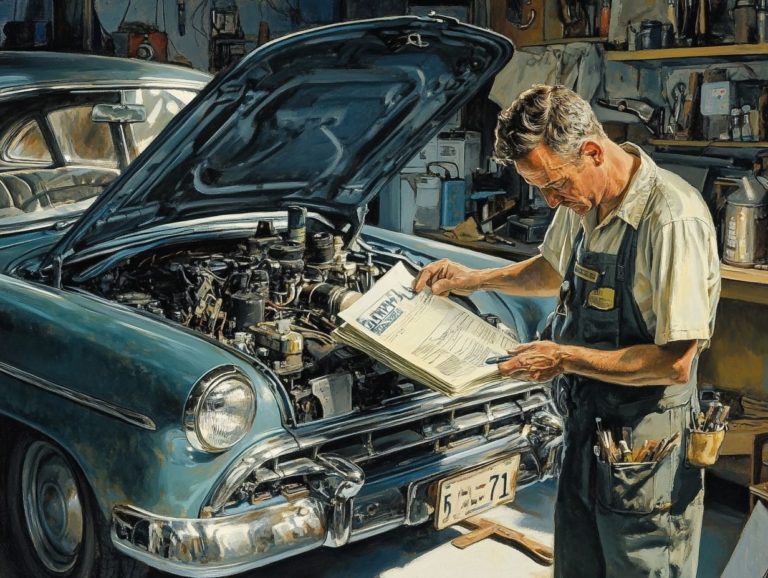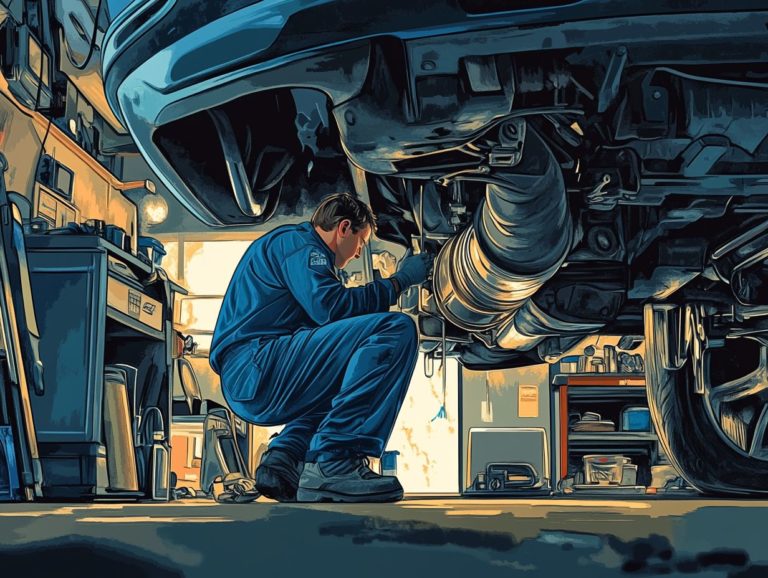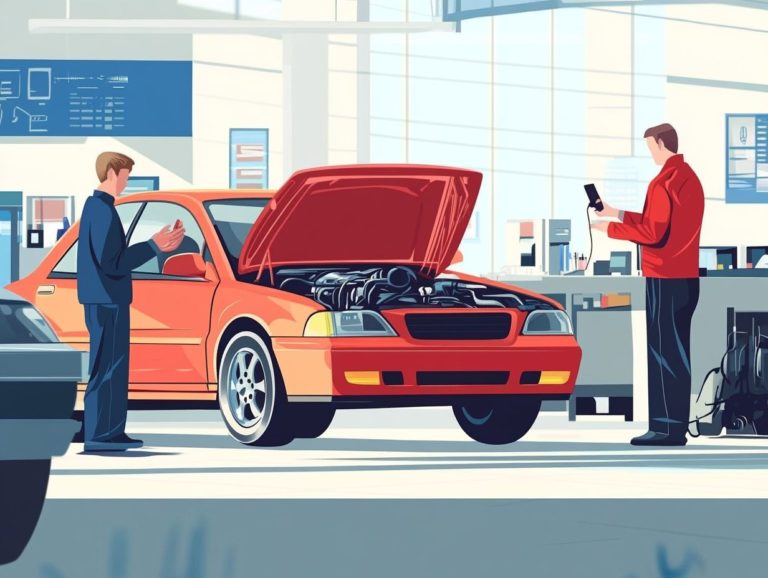How to Avoid Overheating in Your Car
Car overheating is a prevalent issue that can result in expensive repairs and unforeseen breakdowns. For every car owner, it s essential to grasp the causes of overheating, identify early warning signs, and adopt preventive measures.
This article describes the key indicators of overheating, presents a regular maintenance checklist, and outlines emergency steps to take if your vehicle does overheat. You’ll discover valuable tips for optimal vehicle usage and preparation for hot weather, ensuring your car operates smoothly throughout the year.
Contents
Key Takeaways:
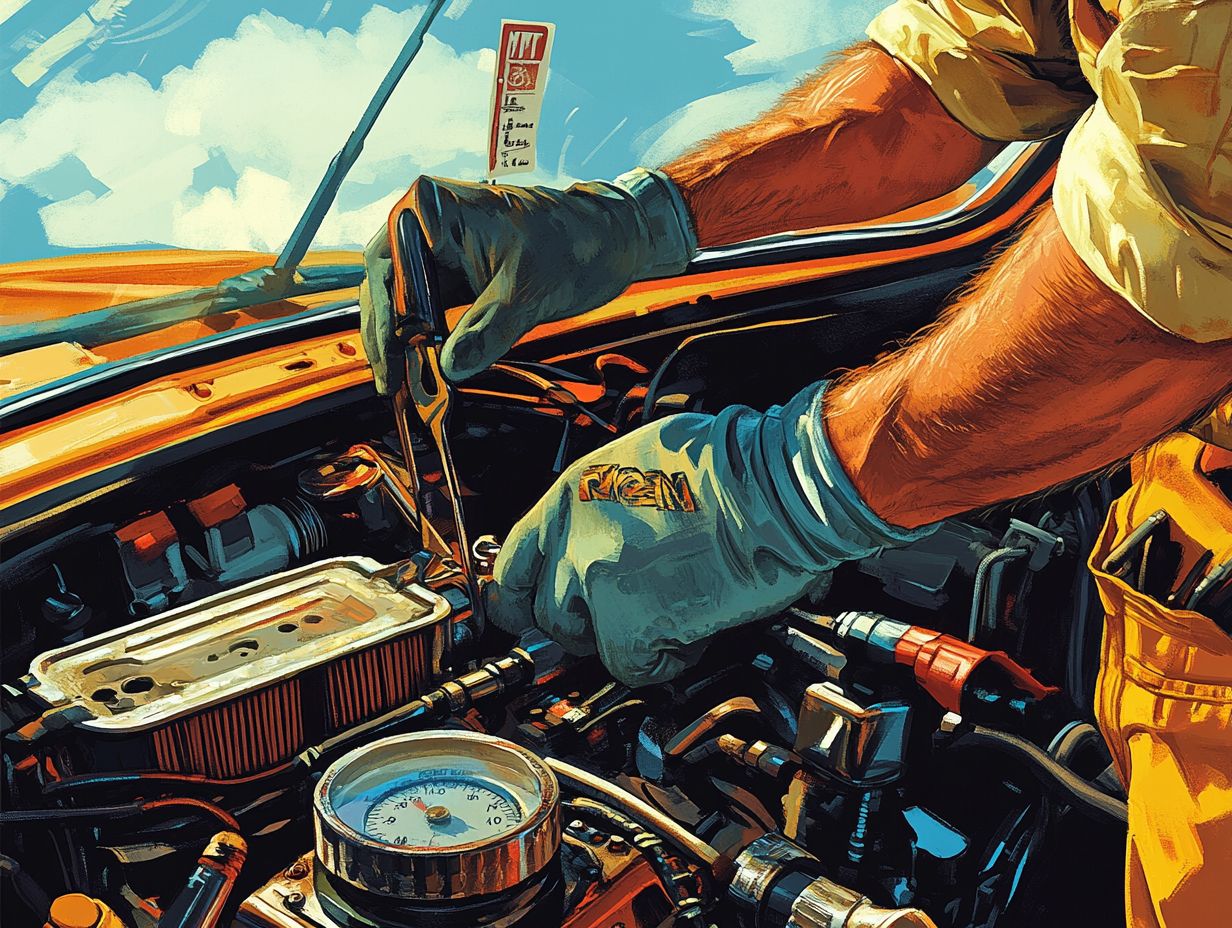
- Regular maintenance and proper usage of your vehicle are key in preventing overheating.
- Knowing the early warning signs and taking immediate action can prevent further damage to your car.
- In hot weather, be sure to check your coolant levels and take breaks during long drives to avoid overheating.
What Causes a Car to Overheat?
Understanding what causes a car to overheat is essential, as it directly impacts engine performance and overall maintenance. Common culprits include insufficient coolant levels, a malfunctioning thermostat, and coolant leaks. These issues can disrupt the engine’s efficient operation.
If overheating occurs, it can lead to severe engine damage if not addressed promptly. Factors like driving conditions, hot weather, and inadequate radiator flushing also significantly contribute to engine overheating.
Temperature gauges are your best friends, serving as vital indicators of your engine’s health. Committing to regular vehicle maintenance like checking and topping off coolant levels and inspecting components such as hoses and the water pump can help you prevent overheating issues.
Signs of overheating include:
- Steam rising from the engine bay
- A warning light on the dashboard
- Strange noises coming from under the hood
Certain driving habits, such as excessive idling in traffic or unnecessarily straining the engine by towing heavy loads, can worsen these problems and potentially lead to sudden engine failures.
Signs of Overheating in Your Car
Recognizing the signs of an overheating car is crucial for safeguarding against severe engine issues and ensuring your driving safety. Common indicators of overheating include a rising temperature gauge, unusual dashboard warning lights, and steam billowing from the engine compartment.
If you notice any of these symptoms, conducting immediate engine checks can help determine whether your coolant system is functioning properly. Ignoring these warning signs can lead to costly repairs and serious engine damage stay vigilant!
Identifying Early Warning Signs
Identifying early warning signs of engine overheating can be your saving grace. Keep an eye out for a consistently rising temperature gauge, fluctuating coolant levels in the reservoir, and unusual noises from the engine compartment. Monitoring these signs closely can significantly enhance your vehicle’s performance.
Watch for steam rising from the hood and a distinct burning smell, as these could point to coolant leaks or overheating components. Ignoring these signals is a gamble that could lead to complete engine failure. By paying attention to the temperature gauge and coolant levels, you can take proactive measures, like adding coolant or seeking a professional inspection, before minor issues escalate into major mechanical headaches.
Acting swiftly when you notice these signs not only prolongs your vehicle’s lifespan but also ensures your safety on the road. Don’t ignore these signs!
Check your coolant today, and keep your car safe!
Preventive Maintenance for Your Car
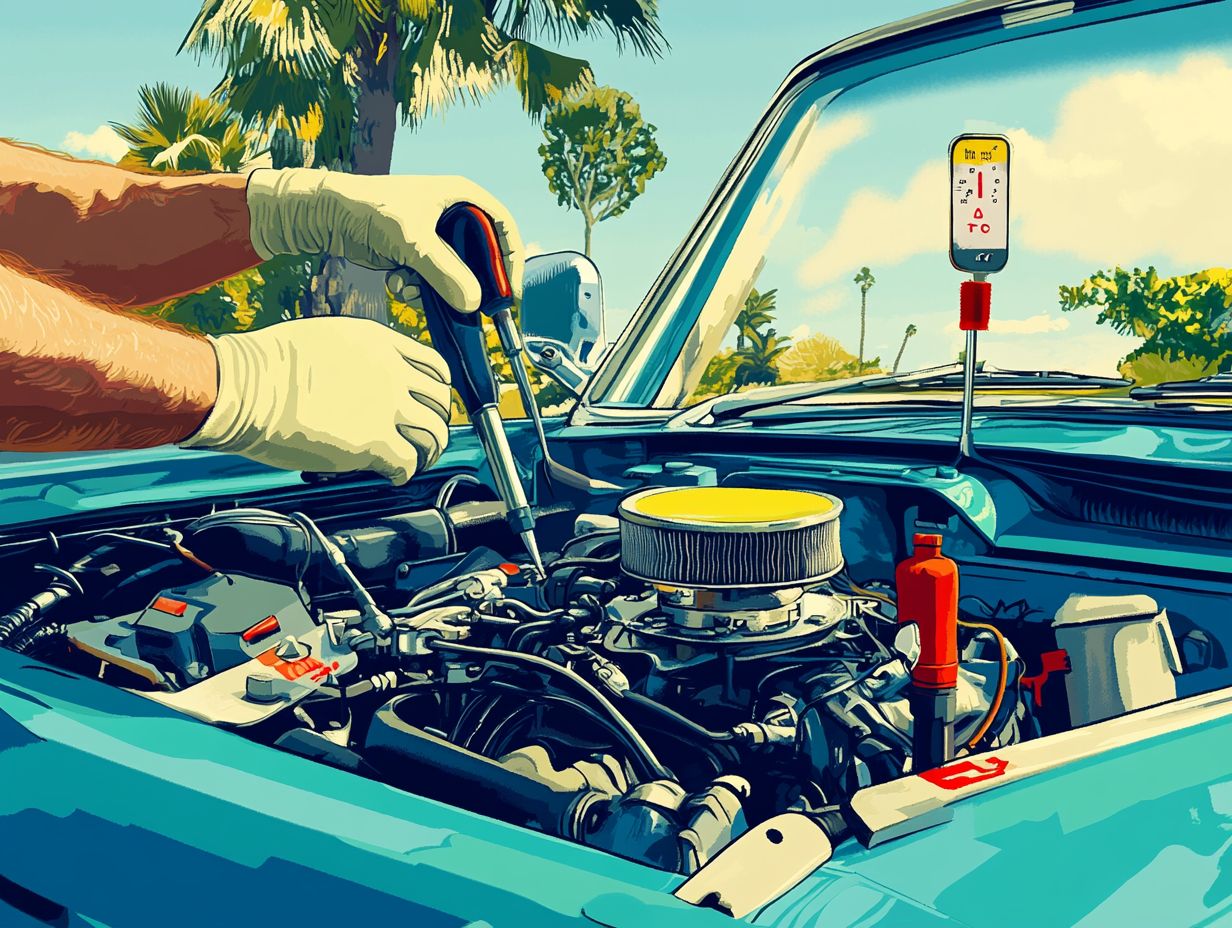
Preventive maintenance is crucial for ensuring your car runs smoothly and avoiding overheating issues that could lead to serious engine damage.
By incorporating regular vehicle maintenance practices like checking coolant levels, cleaning the radiator, and adhering to coolant specifications you can significantly boost your engine’s performance.
Check your engine oil levels regularly to reduce the risk of overheating, no matter the driving conditions you encounter.
Regular Maintenance Checklist
A comprehensive maintenance checklist is essential for keeping your car in peak condition and preventing pesky overheating issues. Include key items such as:
- Checking engine fluids like oil and antifreeze
- Performing radiator cleaning regularly
- Monitoring coolant levels to stay within specified limits
This routine check not only enhances engine power but also prolongs the lifespan of crucial engine components.
Don’t overlook the air filter; inspecting it is crucial because a clean filter ensures proper airflow and boosts fuel efficiency.
Tire pressure checks are equally important for safety, enhancing handling and extending tire life. Regular brake inspections ensure braking efficiency and help you catch any wear early on, saving you from costly repairs later.
Take a moment to examine belts and hoses for signs of wear; this simple step can prevent breakdowns and maintain your vehicle’s overall reliability. By sticking to these maintenance tasks, you can significantly elevate your vehicle’s performance and safety, giving you peace of mind on every journey.
Emergency Measures for Overheating
In emergency situations where your car starts to overheat, understanding the right steps to take can be pivotal in preventing minor repairs from escalating into serious engine damage.
- First, pull over to a safe location and turn off the engine.
- Examine the radiator cap and coolant levels to see if there’s a visible coolant leak.
- If needed, give the engine some time to cool down before checking or adding coolant to avoid any potential injury.
By acting swiftly and decisively, you can effectively manage the situation while minimizing the risk of further damage.
Steps to Take When Your Car Overheats
Knowing the specific steps to take when your car overheats is essential for minimizing damage and ensuring your safety on the road. Additionally, learning how to maintain your car’s cooling system can help prevent these issues. As soon as you spot overheating signs like the temperature gauge creeping up or warning lights flickering on your dashboard, safely pull over to a secure area.
Once you re parked, let the engine cool down. Take a moment to check the engine; assess coolant levels and look for any visible leaks. If needed, don t hesitate to reach out to a professional mechanic for assistance.
Taking swift action can save you from costly repairs or an inconvenient breakdown in the middle of nowhere. After you ve pulled over, it s crucial to turn off the engine to prevent further overheating.
While you re waiting for the engine to cool, check your vehicle s coolant reservoir and hoses for leaks or damage, as these can signal underlying issues. If you find the coolant is low, adding the appropriate coolant mixture can sometimes provide a temporary fix.
If you notice significant leakage or the engine continues to overheat, it s wise to avoid driving and call for a tow service. Seeking professional mechanic services ensures that your vehicle is thoroughly inspected and repaired correctly, giving you peace of mind as you prepare to get back on the road.
Tips for Avoiding Overheating
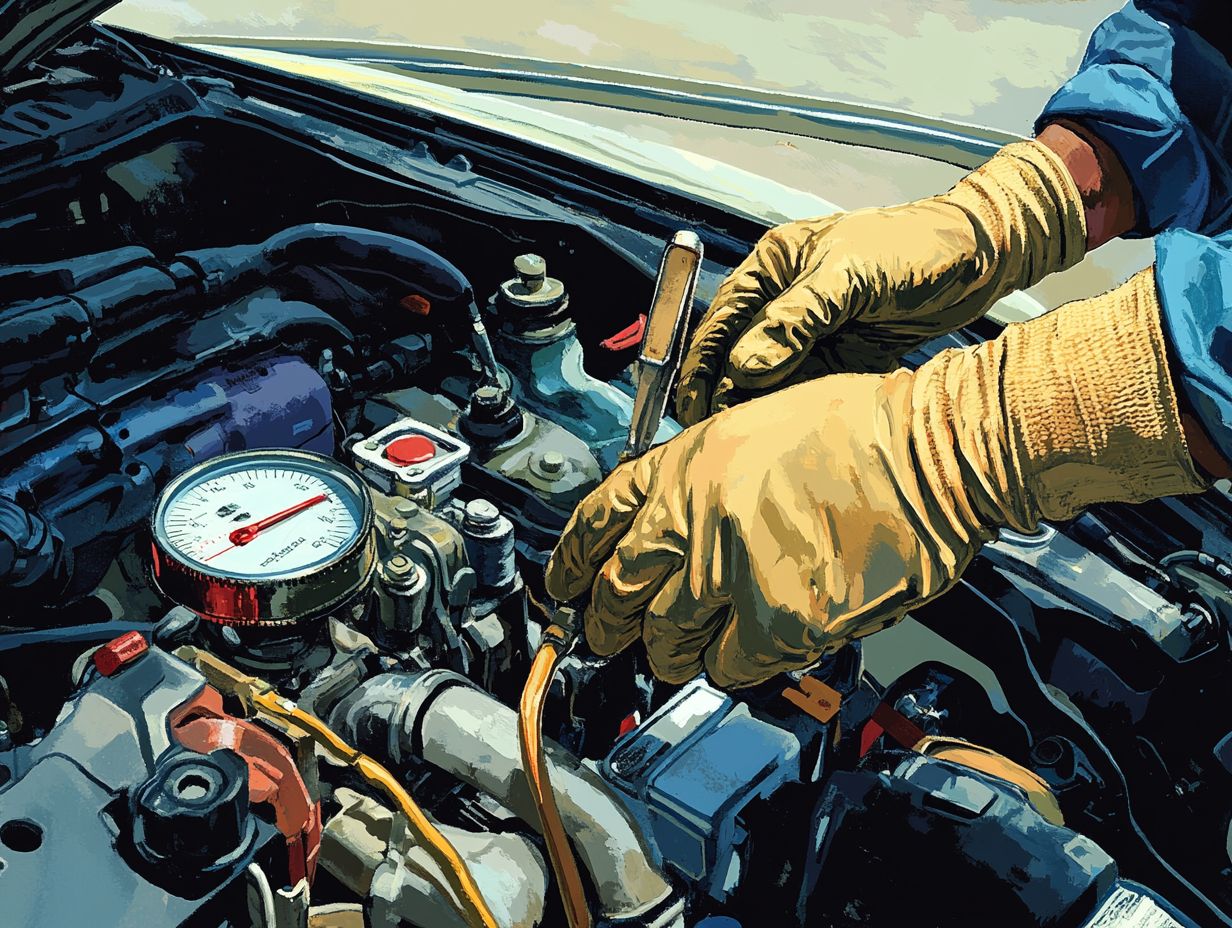
Implementing effective strategies to prevent overheating can significantly extend your vehicle’s lifespan and ensure a safer driving experience. For more detailed guidance, check out what to do if your car overheats. Key approaches involve being mindful of your driving habits; avoid sudden acceleration and maintain a steady speed, especially in high temperatures.
Regularly check the coolant system and ensure that coolant levels are adequate to prevent engine overheating. Understanding how varying driving conditions can influence your vehicle’s overall performance is essential.
Stay proactive to keep your car running smoothly!
Proper Vehicle Usage and Maintenance
Proper vehicle usage and maintenance are crucial for preventing overheating and ensuring your engine performs at its best. Regular checks should include examining your engine fluids, such as antifreeze and oil, and making sure the radiator cap is securely in place.
In addition to checking antifreeze and oil, inspect hose connections and the thermostat. A thermostat that is not working properly can cause problems with temperature regulation.
Pay close attention to dashboard warning lights, as they serve as early indicators of potential issues. Understanding the importance of monitoring these components helps you make informed maintenance decisions.
Make these routine checks a priority! They can save you from costly repairs and keep your driving experience safer and more reliable. Consistent attention to these factors ensures smooth operation and enhances fuel efficiency, benefiting both you and the environment.
Preparing for Hot Weather
Preparing for hot weather is essential to prevent engine overheating and ensure safe driving conditions. Start by cleaning the radiator and checking coolant specifications. Make sure the coolant reservoir is filled to the appropriate level before any long journeys.
A well-maintained vehicle is your best ally against high temperatures. Regularly maintaining these components boosts efficiency and extends the lifespan of your vehicle.
Be vigilant about checking for any leaks in the cooling system; even a tiny leak can escalate into significant problems if left unchecked. Periodically flushing the radiator helps eliminate debris, ensuring optimal heat dissipation.
It’s also wise to confirm that the thermostat is functioning as it should. A faulty thermostat can disrupt the cooling cycle, potentially leading to serious issues. By proactively addressing these tasks, you fortify your vehicle’s reliability for the sweltering months ahead.
Frequently Asked Questions
What causes a car to overheat?
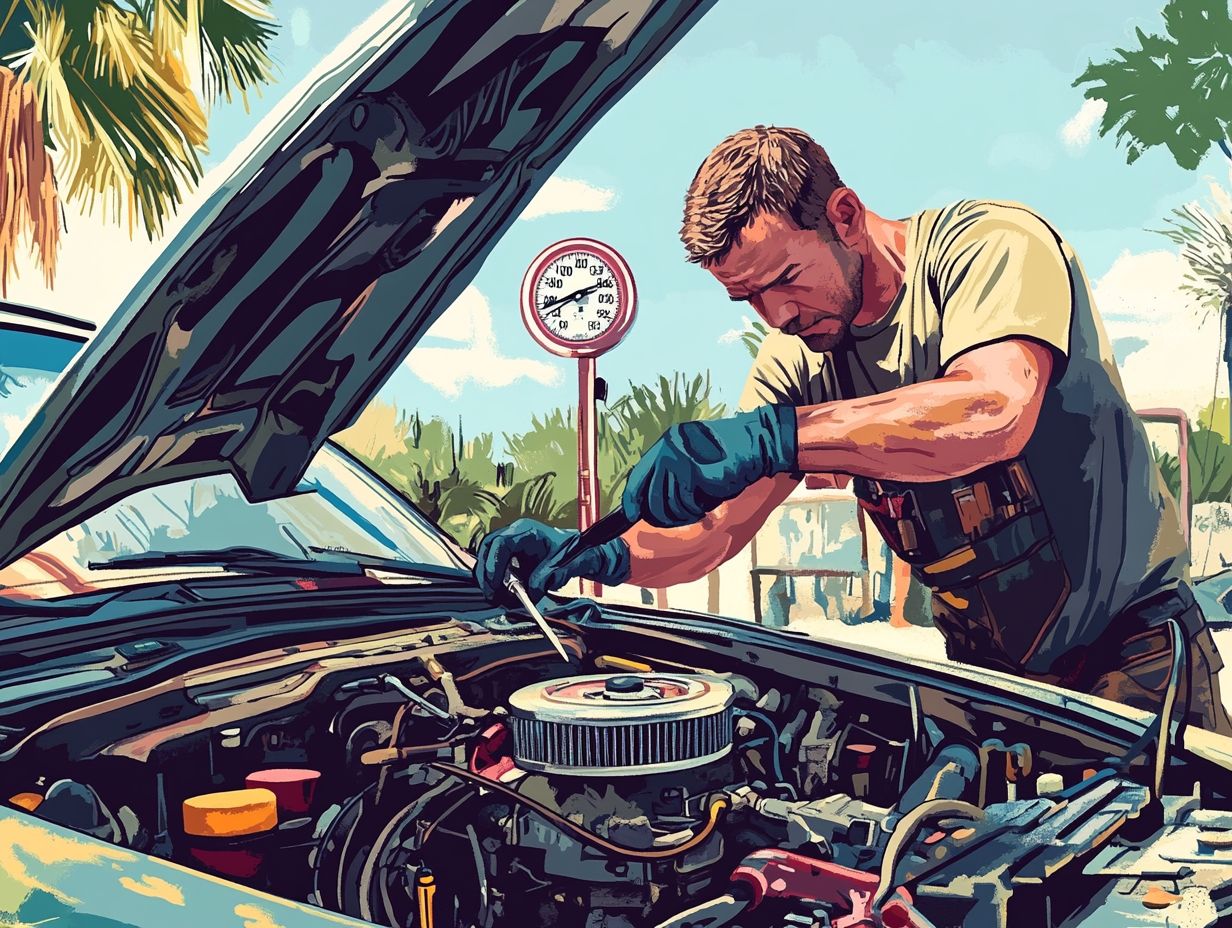
Several factors can cause a car to overheat, such as low coolant levels, a thermostat that is not working properly, a faulty radiator, or a clogged cooling system.
How can I prevent my car from overheating?
Regular maintenance and monitoring of your car’s cooling system can help prevent overheating. This includes checking coolant levels, replacing old or worn belts and hoses, and keeping the radiator clean. For additional guidance, refer to this resource on how to handle common overheating issues.
What should I do if my car starts to overheat while driving?
If your car’s temperature gauge rises while driving, pull over to a safe location and turn off the engine. Let the car cool down for at least 30 minutes before checking coolant levels or opening the radiator cap.
Can weather affect my car’s tendency to overheat?
Yes, hot weather can put extra strain on your car’s cooling system and increase the likelihood of overheating. It’s important to monitor your car’s temperature gauge and take precautions during hot weather.
Why is it important to address overheating issues immediately?
Ignoring an overheating car can lead to serious damage to the engine and other components. If you encounter this problem, it’s crucial to know what to do if your car overheats and address any issues as soon as possible to avoid costly repairs and breakdowns.
Should I add water to my car’s radiator if it overheats?
No, water alone is not sufficient for cooling your car’s engine. Use a mixture of water and coolant to prevent overheating and protect the engine from corrosion.
We’d love to hear from you! Have you had experiences with vehicle maintenance? Share your tips or stories in the comments below.

